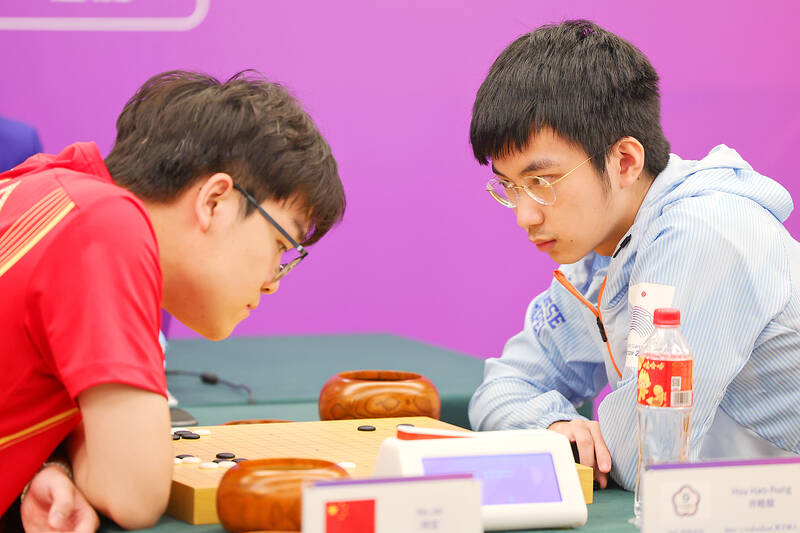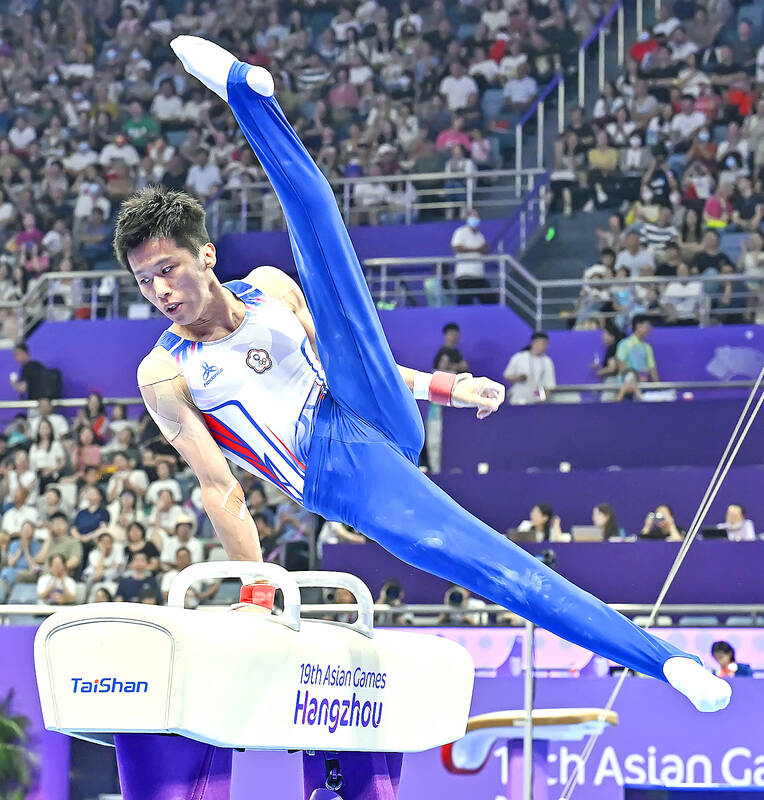Taiwanese go player Hsu Hao-hung (許皓鋐) yesterday won his first-ever gold medal at the 19th Asian Games in Hangzhou, China, after defeating Chinese player Ke Jie (柯潔).
It was the first gold medal that Taiwan has won in go at the Asian Games, helping bring the nation’s total medal count at day’s end to four golds, four silvers and six bronzes.
The 22-year-old Hsu is considered Taiwan’s premier go player after claiming first place in all eight go competitions in Taiwan.

Photo: CNA
Hsu defeated South Korea’s Park Jung-hwan yesterday to qualify for the semi-finals before defeating Shin Jin-seo to become the first Taiwanese player to ever qualify for the gold-medal match.
Taiwan in 2010 won the bronze medal in women’s go at the Asian Games in Guangzhou, China, and Taiwanese-Australian player Joanne Missingham and Taiwan’s Chou Chun-hsun (周俊勳) came in fourth in the mixed doubles at the same event.
Also yesterday, Taiwan nabbed a gold medal in men’s pommel horse after Lee Chih-kai (李智凱) successfully defended the title he won in 2018.

Photo: Chen Chih-chu, Taipei Times
The 27-year-old Olympic medalist, known as the “prince of the pommel horse,” topped the event with a score of 15.500, while Japan’s Ryota Tsumura won silver with 15.166.
Fellow Taiwanese gymnast Shiao Yu-jan (蕭佑然) fell just short of the podium after scoring only 0.034 points lower than bronze medalist Nariman Kurbanov from Kazakhstan with 15.100.
“I was so nervous, I was really stressed before my turn,” Lee told reporters, commenting on how much he wanted to defend his crown and challenge himself.
He added that he made some mistakes in the beginning, so he quickly adjusted, and was surprised to get the same score as at the World University Games earlier this year.
Lee’s next stop is the World Artistic Gymnastics Championships in Belgium from today to Sunday next week. His goal is to reach the finals and qualify for next year’s Paris Olympics.
In the e-sports competition, Taiwanese Street Fighter V: Champion Edition players Lin Li-wei (林立瑋), known as “Oil King,” and Hsiang Yu-lin (向玉麟), known as “GamerBee,” faced off against each other in the losers’ bracket final, sending Hsiang to the finals with a 4-2 win and Lin home with a bronze.
However, Hsiang had to settle for silver after losing to South Korea’s Kim Gwan-woo 4-3.
Meanwhile, taekwondo athlete Lee Meng-en (李孟恩) won a bronze medal in the men’s over-80kg event yesterday, following a 2-0 semi-final loss to Arian Salimi of Iran.
In the quarter-finals Lee Meng-en fought an outstanding match to outlast Nikita Rafalovich of Uzbekistan, gold medalist at the last Asian Games, 2-1, but lost in straight rounds to Salimi 14-10, 16-13 to finish in third place.
Salimi won the bronze medal at the World Taekwondo Championships in May.
As a result of Lee Meng-en’s loss, Taiwan’s taekwondo team won no gold medals for the first time in the Asian Games.
Taiwanese athletes Lin Wei-chun (林唯均) and Lo Chia-ling (羅嘉翎) won silver medals in the women’s under-53kg and women’s under-57kg categories respectively.

CHAOS: Iranians took to the streets playing celebratory music after reports of Khamenei’s death on Saturday, while mourners also gathered in Tehran yesterday Iranian Supreme Leader Ayatollah Ali Khamenei was killed in a major attack on Iran launched by Israel and the US, throwing the future of the Islamic republic into doubt and raising the risk of regional instability. Iranian state television and the state-run IRNA news agency announced the 86-year-old’s death early yesterday. US President Donald Trump said it gave Iranians their “greatest chance” to “take back” their country. The announcements came after a joint US and Israeli aerial bombardment that targeted Iranian military and governmental sites. Trump said the “heavy and pinpoint bombing” would continue through the week or as long

TRUST: The KMT said it respected the US’ timing and considerations, and hoped it would continue to honor its commitments to helping Taiwan bolster its defenses and deterrence US President Donald Trump is delaying a multibillion-dollar arms sale to Taiwan to ensure his visit to Beijing is successful, a New York Times report said. The weapons sales package has stalled in the US Department of State, the report said, citing US officials it did not identify. The White House has told agencies not to push forward ahead of Trump’s meeting with Chinese President Xi Jinping (習近平), it said. The two last month held a phone call to discuss trade and geopolitical flashpoints ahead of the summit. Xi raised the Taiwan issue and urged the US to handle arms sales to

State-run CPC Corp, Taiwan (CPC, 台灣中油) yesterday said that it had confirmed on Saturday night with its liquefied natural gas (LNG) and crude oil suppliers that shipments are proceeding as scheduled and that domestic supplies remain unaffected. The CPC yesterday announced the gasoline and diesel prices will rise by NT$0.2 and NT$0.4 per liter, respectively, starting Monday, citing Middle East tensions and blizzards in the eastern United States. CPC also iterated it has been reducing the proportion of crude oil imports from the Middle East and diversifying its supply sources in the past few years in response to geopolitical risks, expanding

Pro-democracy media tycoon Jimmy Lai’s (黎智英) fraud conviction and prison sentence were yesterday overturned by a Hong Kong court, in a surprise legal decision that comes soon after Lai was jailed for 20 years on a separate national security charge. Judges Jeremy Poon (潘兆初), Anthea Pang (彭寶琴) and Derek Pang (彭偉昌) said in the judgement that they allowed the appeal from Lai, and another defendant in the case, to proceed, as a lower court judge had “erred.” “The Court of Appeal gave them leave to appeal against their conviction, allowed their appeals, quashed the convictions and set aside the sentences,” the judges